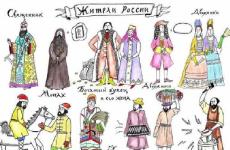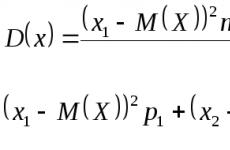What does the former Minister of Sports Mutko. Why Vitaly Mutko was appointed Deputy Prime Minister
Vitaly Leontyevich Mutko was born on December 8, 1958 in the village of Kurinskaya, Krasnodar Territory. In 1972 he entered a vocational school, and then moved to the Nautical School of the city of Petrokrepost, Leningrad Region. In 1977-1978, Mutko was a sailor on the ships of the North-Western River Shipping Company and the Leningrad Sea Port. In 1978 he continued his studies, enrolling in the Leningrad River School. He graduated in 1983 and was sent to the Kirov District Executive Committee of Leningrad. At the same time he entered the Leningrad Institute of Water Transport, graduating in 1987.
In the executive committee of the Kirovsky district, Mutko worked as an instructor and head of the department for social issues. By 1990, he became secretary, and after that, chairman of the executive committee. Also in 1990, Mutko became a deputy of the Kirov District Council, and in 1991 - the head of the administration of the Kirov District. In 1992, Mutko took the position of Deputy Mayor of St. Petersburg Anatoly Sobchak and Chairman of the Mayor's Committee on Social Issues. He supervised culture, health care and sports.
Since 1992, Mutko has been the curator of the Zenit football club from the government of St. Petersburg, and in 1995 he became its president. In 1996, Vladimir Yakovlev became the new governor of St. Petersburg instead of Sobchak, after which Mutko left the city government and focused on working at Zenit. He remained club president until 2003.
In 1999 Mutko graduated Faculty of Law St. Petersburg State University. In the 2000 presidential election, he was one of the confidants of candidate Vladimir Putin. In the same year, he headed the election headquarters of Valentina Matvienko, who announced her intention to participate in the election of the governor of St. Petersburg, but then withdrew her candidacy. In 2003, after Putin, who became president, removed Yakovlev, Matvienko was nevertheless elected head of the city.
From August 2001 to October 2003, Mutko served as president of the Russian Football Premier League (RFPL). On October 29, 2003, Matvienko was appointed representative in the Federation Council from the government of St. Petersburg, became chairman of the commission on youth and sports. On April 2, 2005, at a meeting of the executive committee of the Russian Football Union (RFU), Mutko was elected president of this organization. In June 2006 he defended his dissertation for the degree of candidate of economic sciences. On February 21, 2007, he was re-confirmed as a senator. In September 2007, he was appointed a member of the Council for Development under the President of the Russian Federation physical culture and sports and the preparation and holding of the XXII Winter Olympic Games in Sochi.
In March 2008, Dmitry Medvedev, First Deputy Prime Minister and Putin's successor, won the presidential election. On May 8, at a meeting of the State Duma, Putin was approved as prime minister, and on May 12, he made appointments to the government. Mutko headed the newly created Ministry of Sports, Tourism and Youth Policy of the Russian Federation in the cabinet. At the same time, he retained the post of head of the RFU.
Mutko is married and has two daughters.
Mutko Vitaly LeontievichMutko Vitaly Leontievich- Russian statesman, Deputy Prime Minister Russian Federation for construction and regional development since May 18, 2018. Deputy Chairman of the Government of the Russian Federation for Sports, Tourism and Youth Policy (October 19, 2016 - May 18, 2018). President of the Russian Football Union (2005-2018). Minister of Sports of the Russian Federation (May 21, 2012 - October 19, 2016). Minister of Sports, Tourism and Youth Policy of the Russian Federation (2008-2012). Member of the Federation Council of the Federal Assembly of the Russian Federation from the executive body of state power of St. Petersburg (2003-2008).
Biography
Mutko Vitaly Leontievich, 12/08/1958 year of birth, native of the camp. Kurinskaya Apsheronsky district of the Krasnodar Territory.
Relatives. Wife: Tatyana Ivanovna Mutko, born on August 6, 1954, pensioner. Currently managing household. Previously, she worked in the personnel department of the Baltic Shipping Company and headed a number of structures affiliated with the Zenit football club.
Daughter: Elena Vitalievna Mutko, born on 01/05/1977, entrepreneur. Currently owns a dental clinic in St. Petersburg.
Daughter: Mutko Maria Vitalievna, born on September 7, 1985, lawyer.
Awards. Order "For Merit to the Fatherland" III degree. The order was awarded on March 24, 2014 at the ceremony of awarding state awards to the organizers of the 2014 Olympic and Paralympic Games, coaches and heads of sports federations. Order "For Merit to the Fatherland" IV degree. Order of Honor. Order of Friendship. Medal "In memory of the 300th anniversary of St. Petersburg" Medal "In memory of the 1000th anniversary of Kazan" Honored Worker of Physical Culture of the Russian Federation. Honorary Diploma of the Government of the Russian Federation. Honorary Diploma of the Federation Council of the Federal Assembly of the Russian Federation.
State. Anti-corruption declaration 2014 Income RUB 6,081,180.00 Spouse: RUB 1,531,444.00 Real estate Apartment, 117.8 sq. m (in use) Apartment, 150.8 sq. m, shared ownership 0.25 Apartment, 252.7 sq. M, Shared Ownership 1/3 Parking Place, 15.3 Sq. m Wife: Land plot, 1605 sq. m Spouse: Land, 11739 sq. m Spouse: Apartment, 46.6 sq. m Spouse: Apartment, 117.8 sq. m (in use) Spouse: Apartment, 150.8 sq. m, shared ownership 0.25 Spouse: Apartment, 252.7 sq. M, Shared Ownership 1/3 Spouse: Dacha, 177.3 Sq. m Spouse: Garage, 12 sq. m Vehicles Passenger car, Mercedes-Benz E-class.
Education
He graduated from the Leningrad Institute of Water Transport Engineers and the Faculty of Law of St. Petersburg State University (he studied at both universities in absentia). It has degree candidate of economic sciences.
Labor activity
- After graduating from a nautical vocational school in the city of Petrokrepost, Leningrad Region, for some time he worked as a sailor-minder on the ships of the Leningrad Sea Port and in Komsomol work in the management of the North-Western River Shipping Company.
- In 1978 he entered the Leningrad River School, where he was the secretary of the Komsomol committee, then switched to party work.
- In 1983 he became an instructor at the Kirov District Committee of the CPSU of Leningrad. Then he was the head of the department for social issues of the same district committee and secretary of the district executive committee.
- In the period from 1990 to 1992, he headed the district as chairman of the district executive committee and head of the administration.
- In 1992, Mutko was invited to the post of chairman of the Committee on Social Issues of the St. Petersburg Mayor's Office in the rank of vice-mayor. Left his post in 1996 after losing the mayoral election to A.A. Sobchak.
- From 1997 to 2003 he was the president of the Zenit football club (St. Petersburg).
- In 2001, he headed the football Premier League created on his initiative.
- In 2003, he became a member of the Federation Council of the Federal Assembly of the Russian Federation from the government of St. Petersburg.
- In 2005 he was elected President of the Russian Football Union (remained in this position until 2009).
- In 2008 he was appointed Minister of Sports, Tourism and Youth Policy of the Russian Federation. At the same time, he is the chairman of the board of trustees of the Russian Football Union and a member of the executive committee of the International Football Federation (FIFA).
- On September 2, 2015, Mutko was re-elected President of the Russian Football Union.
- In October 2016, he left the post of Minister of Sports and was appointed Deputy Prime Minister of the Government of the Russian Federation, responsible for sports, tourism and youth policy.
- In December 2017, he suspended his work as president of the Russian Football Union (RFU) for six months.
- On May 18, 2018, he was again appointed to the post of Deputy Prime Minister of the Russian Federation.
- On December 19, 2018, he finally left the post of president of the Russian Football Union (RFU).
Vitaly Leontievich Mutko - Minister of Sports of the Russian Federation, previously was the head of the Ministry of Sports and Tourism, the RFU, a member of the Federation Council from St. Petersburg, served as vice-mayor of the Northern capital. Mutko Vitaly Leontyevich Mutko is known for the fact that in 2010 in Zurich he himself presented the successful application of the Russian Federation for the right to host the 2018 World Cup. The official's speech is bad English language, read at the ceremony of choosing the host countries of the championship, caused a lot of jokes on the Internet (its text was allegedly written in Russian letters).
CHILDHOOD OF VITALY MUTKO
The future high-ranking official was born on December 8, 1958 in the south of Russia, in the village of Kurinskaya, located on the Pshish River in the Krasnodar Territory. His parents came from a simple working environment: the head of the family was a loader, his mother was a machine operator. In his youth, Vitaly wanted to become a captain of a ship, so after 8 classes he applied to the Rostov River School, but did not enter. However, he did not return home, but successfully passed the exams at the naval vocational school in the city of Petrokrepost, Leningrad Region. Upon graduation in 1977, he worked on ships as a sailor for a year. Vitaly Mutko at the Summer Universiade in Kazan (2013) Later, remaining true to his childhood dream,

Mutko went to the seafarer, where he was considered an excellent student and a Komsomol activist. At the end of this average educational institution, Vitaly was nominated to executive agency Kirovsky district, where he rose to the rank of head of the district administration. In 1987, he completed a correspondence course at the Institute of Water Transport Engineers. And in 1999, Vitaly graduated in absentia from the law faculty of St. Petersburg State University.
POLITICAL CAREER OF VITALY MUTKO
Since 1992, Mutko, thanks to friendly relations with Anatoly Sobchak, became a member of the city leadership, became vice-mayor. At the same time, Vladimir Putin worked in the government of the northern capital. Vitaly Mutko and Vladimir Putin worked together in Leningrad. In 1994, the official was a co-founder of the Golden Pelican charitable society in the northern capital. After Sobchak's defeat in the 1996 elections, Vitaly Leontievich resigned from his post, at the same time Putin also left his post.

VITALY MUTKO AND SPORT Later, Vitaly Leontievich became the president and one of the owners of FC Zenit. While still in the civil service and supervising the sports club, Mutko, according to the press, allocated $ 400,000 annually to finance it from the city budget. Later, with the assistance of Putin, Vitaly attracted Taimuraz Bolloev's Baltika brewing company as a sponsor of the football club. Vitaly Mutko's sports career began with Zenit Thanks to the financial support that grew several times under Mutko, Zenit was able to invite good players and mentors, and, as a result, achieve significant results. Namely, for the first time in its history, to win the Russian Cup in 1998/99, bronze in the national championship in 2001 and silver in 2003. Although sometimes there were rumors that some games were allegedly contractual. Vitaly Mutko watches the match of the women's water polo team
In the presidential elections in 2000, Mutko, among the confidants of the future leader Vladimir Putin, headed the campaign headquarters of Valentina Matvienko. Due to the low rating, she then abandoned her intention to run for the governor's position, she was again taken by Vladimir Yakovlev.

But in 2003, after the dismissal of the governor by Putin, Matvienko nevertheless became the head of the Northern capital. Vitaly Mutko "From Heath Heart" In 2001, Mutko was the initiator of the emergence of RFPL (Russian Football Premier League), which unites professional clubs in the top division, which he headed. After 2 years, thanks to Matvienko, he began to work in the Federation Council. In 2005 he headed the Russian Football Union, in 2006 he was a member of the Technical Committee and the FIFA Development Committee. In 2008, Mutko is the head of the Ministry of Sports and Tourism, since 2009 he has been a member of the FIFA executive committee. On November 24, 2009, three changes took place in the career of an official at once - he left the leading position in the RFU, was elected head of its Board of Trustees, and was also appointed curator of the 2018 World Cup.
Minister Vitaly Mutko In 2012, Mutko entered the new cabinet of ministers, retaining the ministerial chair of the sports department. This year, the Ministry of Sports, Tourism and Youth Policy of the Russian Federation was transformed into the Ministry of Sports, in which Vitaly Mutko took the lead. Tourism functions were transferred to the Ministry of Culture and youth policy to the Ministry of Education.

According to data published on the official website of the government of the Russian Federation, Vitaly Leontievich earned 9.8 million in 2012, 12.8 million in 2013, and 6.1 million rubles in 2014. The events around the Minister of Sports and the Olympics in Vancouver were widely discussed by the public. The Accounts Chamber then discovered flagrant violations of the procedure for financing the costs of the Games. In particular, according to the report of this control body, the maximum allowable daily maintenance of Vitaly Leontyevich himself, who settled in a luxurious hotel, was exceeded by more than an order of magnitude, and more than a dozen outsiders were included in the official delegation.
Among them, the media named Tatyana, wife of Mutko, Yana Rudkovskaya, wife of Evgeny Plushenko, Kristina, daughter of Valentin Piseev. In total, 6.2 billion budget funds (over $221 million) were spent on the event. Vitaly Mutko impressed Western journalists with English PERSONAL LIFE OF VITALY MUTKO Mutko is married. His wife, Tatyana Ivanovna, now a housewife, previously worked in the staff of the Baltic Shipping Company.
She contributed to the development of her husband's career by introducing him to the director of her company, Viktor Kharchenko, who helped him get closer to Anatoly Sobchak. As a result, Mutko received the post of head of the administration of the Kirovsky district. Vitaly Mutko and his wife Later he became the owner of 0.13 hectares of land, a Mercedes E 530 car, apartments of 253 and 151 square meters, signed a 49-year lease country house in 177 "squares".

Tatyana was also a co-owner of the Levada trading company, established in 2002, the general director construction company Vitalema, which acquired a 12% stake in Zenit and shares in other organizations affiliated with it. At present, Vitalema is the main owner of the UAB equestrian club. The couple raised two daughters. The eldest of them, Elena, is an entrepreneur.

She was CEO and co-founder of the dental clinic "Leon". In 2010, the businesswoman founded the Vicon laser cosmetology clinic. Her younger sister, Maria, is a law student at St. Petersburg State University, which their father graduated from. Vitaly Mutko with his wife at Euro 2012 The minister likes piano music, films with Robert de Niro and Richard Gere, Jack London's stories, Veniamin Kaverin's book "Two Captains". Vitaly Mutko has a number of awards and badges of honor, including the Order of Merit for the Fatherland, IV degree (2008), the Medal "In Commemoration of the 300th Anniversary of St. Petersburg" (2003), the Order of Friendship (2002). VITALY MUTKO TODAY In September 2015, Vitaly Mutko was re-appointed to the post of President of the RFU. His powers were extended until September 2016.

Read more: http://www.uznayvse.ru/znamenitosti/%D0%B2%D0%B8%D1%82%D0%B0%D0%BB%D0%B8%D0%B9-%D0%BC%D1% 83%D1%82%D0%BA%D0%BE.html
How is the rating calculated?◊ The rating is calculated based on the points awarded for last week
◊ Points are awarded for:
⇒ visiting pages dedicated to the star
⇒ vote for a star
⇒ star commenting
Biography, life story of Mutko Vitaly Leontyevich
Vitaly Leontievich Mutko is a politician, head of the Ministry of Sports of Russia. Previously, he was the head of the Ministry of Sports and Tourism, a member of the Federation Council, and served as vice-mayor of St. Petersburg.
basic information
Mutko was born in the village of Kurinskaya ( Krasnodar region) December 8, 1958. The father of the future successful official worked as a loader, and his mother worked as a machine operator in the timber industry. As a child, Vitaly was a calm and obedient child. At school, he studied diligently and was considered one of the best students.
As a child, Vitaly dreamed of being a sea captain. After graduating from 8 classes, the boy left for Rostov-on-Don, because he wanted to study at the river school. However, the exams were failed, but Vitaly was not at a loss and left for Leningrad, where he entered a vocational school, and then transferred to a nautical school, which he graduated with honors, having received the specialty of a minder.
Mutko, after studying at a vocational school, worked as a sailor in the seaport of Leningrad. He was engaged in sightseeing ships and bulk carriers, on which he sailed many times to other countries. In 1978, Vitaly entered the local river school, after which he began to study at the Institute of Water Transport.
After graduating from the institute, Vitaly began studying at the St. Petersburg State University at the department of economics. In 2006, Mutko defended his Ph.D. thesis at the State University of Finance and Economics. Despite his love for the sea, Vitaly Mutko headed for big politics and important connections, which helped him become a key figure in sports and government circles.
Political activity
While studying at the institute, Vitaly was active on the Komsomol line, which eventually led him to Communist Party. Party work made Mutko the head of the Kirovsky district of Leningrad. Further, he became one of the founders of the Council of Chairmen, and a year later the Council nominated the mayor of the city.
CONTINUED BELOW
Devotion made it possible for Mutko to reach serious heights in the political sphere. Vitaly Leontyevich received the post of vice-mayor of the city, where he controlled sports, culture and health issues. At this time, the team included many well-known politicians, for example, .
In 1992, Vitaly Leontyevich got into football, becoming the curator of the Zenit government club, of which he became the head a little later. After 4 years, Mutko's career began to decline, as the team promised to resign if they lost. The mayor of the city still lost the battle for the seat, but only Kozak and Mutko left the government.
After leaving his post, Vitaly Leontievich began to actively engage in Zenit and led this team until 2003. Thanks to Mutko, the team achieved high quality new level and became elite.
Head of the Ministry of Sports
In 2000, Mutko took the position of head of the Premier League, after 5 years he began work as president of the Football Union of Russia. Further, Vitaly Leontyevich was appointed to the post of chairman of the commission dealing with sports.
After becoming president of the country in 2008, Mutko began to head the Ministry of Tourism, Sports and Youth Policy, while he did not leave the post of president of the RFU. The public reacted ambiguously to such an act, so Mutko left the Federation Council and concentrated on the problems of the executive branch.
A year later, the official became a member of the executive committee of FIFA - the International Football Federation, a few months later he announced that sports structures should be headed by athletes, not officials. Mutko stopped working as president of the RFU, but retained the position of minister of sports.
In 2015, the official returned the post of president of the RFU. The combination of the work of the Minister of Sports and the President of the RFU was provided for until September 2016. The official himself was going to be the head of the RFU until 2018, and specifically - before the start of the World Cup in Russia.
Private life
He met his wife Tatyana Mutko when she worked in the personnel structure of the Baltic Sea Shipping. Tatyana Mutko left her job and devoted her life to her family and husband.
In 2010, Tatyana became a figure in the scandal that unfolded as a result of the visit of the Russian delegation to Vancouver for the Olympics. It turned out that Mutko's wife is not an official member of this delegation, therefore she cannot carry out such visits at public expense. An unfortunate misunderstanding hastened to settle, Mutko's wife paid 52 thousand rubles in compensation for her flight.
The couple have two daughters: Maria and Elena. The eldest daughter Elena is a serious entrepreneur and heads the Leon Dental Center. Maria decided to follow in her father's footsteps and majored in economics.
Mutko owns two plots of land, as well as an apartment of 18 square meters. The spouses have shares in other apartments.
Mutko Vitaly Leontyevich (b. 1958) is a Russian statesman and public figure. He can rightly be called the main character of Russian sports. In the government of the Russian Federation, he works as deputy chairman for sports, tourism and youth policy. For a long time he served as President of the Russian Football Union. From 2008 to 2016 he was the Minister of Sports of the Russian Federation.
Childhood
Vitaly was born on December 8, 1958 in the village of Kurinskaya on the Pshish River, Apsheronsky District, Krasnodar Territory. At birth, the boy was given the name Victor, but receiving a passport, he decided to change it to Vitaly.
Mutko's parents were ordinary working people. Dad worked as a loader, mom worked as a machine operator in the timber industry.
The boy was very fond of sports since childhood. He played football for the village team, even played for the district championship. Their principal rival was then a team from neighboring Khodyzhensk. After lessons in the school gym, he was engaged in boxing with other boys.
And in his studies, he was practically the first in the class, among his classmates he was considered an authority and a leader. If the teacher needed to go somewhere during the lesson, Mutko was left in charge. Almost always the class remained calm, but once there was still a case from which the returning teacher almost fainted. In her absence, the boys, including Vitaly, decided to impress the girls and began to jump out the window from the second floor on a dare. Miraculously, no one broke his leg.

Classmates remember Mutko as a good and fair comrade. Write off always gave. But it happened, while you asked him to write off, you listened a hundred times how important it is to study well yourself. He generally grew up as a good boy, for example, he didn’t smoke himself and drove other boys for it.
Among the girls enjoyed success. When Vitaly smiled, dimples appeared on his cheeks, and the representatives of the weaker sex simply melted from this. In general, Mutko had the usual happy Soviet childhood with Zarnitsa games, school parties and discos. He excelled in dancing. At school he was one of the first dancers, even with his friend and partner girls went to neighboring Khodyzhensk for a competition.
At school, everyone was sure that Mutko would definitely become a sea captain. He loved the sea very much. Once in Tuapse, during a boat trip on a boat, the boy was so impressed by the endless water surface he saw for the first time that he fell in love with the sea once and for all. He said that he was struck by thunder, he liked the seagulls screaming over the waves, the sun setting over the horizon and the salty taste of sea water on his lips so much. From that day on, he only did what he imagined, how in the future, in a white navigator and cap with a cockade, he would give commands: “Right to the helm! Full speed ahead!”
Education
Having received a certificate of eight years of education, in which there were only “fours” and “fives”, Mutko went to enter the navigation department of the Rostov Naval School. But the attempt was not successful, unexpectedly for himself, he received a "deuce" for the dictation.
The guy did not want to return home, the captain's bridge did not give him rest. Having sold a shirt at the clothing market and bought the cheapest train ticket, Vitaly went to the Leningrad region to the city of Petrokrepost (now Shlisselburg). There were very few places in this tiny town where one could get professional education. But for Vitaly, just what he needed was found - vocational school No. 226 of the river fleet (now a technical school for water transport).

From the very first days of his studies, Mutko was a ringleader and an active member of the Komsomol. Soon he became a member of the Komsomol committee, the secretary of the Komsomol organization of the school considered him her right hand. Students (600 young boys) were settled in a hostel, their life was always in full swing, many different events were held. Mutko was distinguished by special organizational skills, he constantly came up with some kind of competitions and tournaments between groups in football and volleyball. And on New Year organized a celebration in the gym, in the center with the guys they set up a huge Christmas tree, they built a stage for the musicians on the side, it was fun.
He studied well, literature was his favorite subject. After classes, the children were given two hours for self-preparation. In the dormitory, they sat down at the tables and studied, and teachers walked around the floors, who could be consulted.
The boys came here to study from all over. Soviet Union, so the leadership of the school tried to get them to know Leningrad better, excursions and trips to the theater were organized three times a week.

Very warmly now Mutko recalls the years of study at the naval school in Petrokrepost. It's a pity, due to being busy in 2003, he didn't manage to come here to celebrate the 50th anniversary of the educational institution. He sent his congratulations by fax, where he wrote: “I am proud that my career began at this school.”
At the end of their studies, the guys were taken to their jobs as minders almost from the final exams, buses from the seaports were already standing and waiting in the yard. But some, instead of distribution, continued to study further. Among them was Vitaly Mutko, he entered the Leningrad River School.
In the new educational institution, he also took an active part in the life of the Komsomol organization, was elected its secretary. He had an internship on ships in the Leningrad Sea Port and in the management of the North-Western River Shipping Company as a sailor-minder. I traveled on a tourist boat along the Volga, and I happened to be abroad, from where farcey brought wool, fabric and lipsticks for sale.

Labor activity in St. Petersburg
But no matter how much Vitaly Mutko dreamed of the sea, he failed to connect his life with it. Even while studying at the Leningrad River School, he went through the management line. In 1979, he was elected chairman of the trade union committee of the educational institution. The following year, 1980, Vitaly joined the ranks of the CPSU.
After graduating from college, he was invited to work in the Kirovsky District Executive Committee of Leningrad, where he worked for more than ten years. He started here as an instructor, then headed the department for social issues, reached the position of secretary, and then the chairman of the district executive committee. During this time, he managed to graduate in absentia from the Institute of Water Transport Engineers.
In 1991, he headed the administration of the Kirovsky district of Leningrad, but did not work in this post for long. In 1992, he received an invitation from the mayor of St. Petersburg, Anatoly Sobchak, to the post of his deputy for social issues. The mayor's office was skeptical of Sobchak's decision and did not much accept the new deputy. The only one with whom Mutko immediately developed a good, trusting relationship was Vladimir Putin.

Vitaly worked in Sobchak's team until 1996, during this period he oversaw not only social issues, but also sports, culture, and healthcare. One of his major projects was the preparation of the northern capital for the Goodwill Games in 1994. Then these sports competitions in scale could be compared with the Olympics. The mayor's office of St. Petersburg believed that this was an important event in terms of improving the image of the city, a lot of money was allocated for the preparation and holding of the games. To increase the attention of citizens to the Goodwill Games, Sobchak organized a swim in the army sports club among members of the city government, in which Mutko also took part.
When Sobchak lost in the next gubernatorial election, Mutko resigned from the city government. In fact, he lost his job. Since 1992, as a city hall official, he has been the nominal president of the Zenit football club. Turning out to be unnecessary to the new St. Petersburg government, Vitaly completely focused on football, Zenit and sports.

Sport
From 1997 to 2003, he served as president of FC Zenit. He managed to bring the club to a decent level, which in the early 1990s completely vegetated, and in 1993 was on the verge of dissolution. Under the leadership of Mutko, Zenit entered and firmly entrenched itself in the elite of Russian football. The team has become the hallmark of the city along with the Hermitage and the Mariinsky Theatre.
- In the summer of 2001, Mutko initiated the creation of the Russian Football Premier League, of which he was soon elected president.
- In 2005, he headed the Russian Football Union (RFU).
- Since 2006 he has been a member of the FIFA Development Committee.
- In the spring of 2008, Russian President Dmitry Medvedev signed a decree appointing Mutko to the post of Minister of Sports, Tourism and Youth Policy.
- In the spring of 2009, he joined the FIFA executive committee. Six months later, in the fall, he was appointed by the Government of the Russian Federation as the curator of the World Cup, which will be held in Russia in 2018.
- In the fall of 2016, he was appointed to the Government of the Russian Federation as Deputy Chairman for Sports, Tourism and Youth Policy.
Mutko paid special attention to the Russian national football team, more than once became the initiator of attracting the best and most expensive coaches in the world to the team.

During his activities in the field of sports, the public has repeatedly criticized Mutko for unprofessionalism and unwillingness to defend the rights of Russian athletes who were unfairly condemned in competitions and deprived of awards. People believe that Vitaly Leontyevich is irresponsible about sports.
In this regard, the opinion of the people does not always coincide with the government. Noting the merits of Mutko in sports work, he was repeatedly awarded awards:
- Order of Friendship.
- Order of Honor.
- Order "For Merit to the Fatherland" III degree.
- Order "For Merit to the Fatherland" IV degree.
In 2002, Mutko was awarded the title of Honored Worker of Physical Culture of the Russian Federation.

doping scandal
In 2016, a WADA (World Anti-Doping Agency) commission report stated that at the 2014 Winter Olympics in Sochi, Russian athletes were doping and sample swapping. The head of this commission, Richard McLaren, confidently announced to the whole world that all this was done on state level and that Sports Minister Vitaly Mutko was aware of the situation.
In connection with these statements, in early December 2017, the International Olympic Committee (IOC) banned Mutko for life from attending the Olympic Games. In the same month, Vitaly Leontievich stepped down as president of the Russian Football Union and left the organizing committee for the 2018 FIFA World Cup. According to the official, he resigned from his positions, as it takes time to appeal to the sports arbitration courts IOC decision regarding his person.
Personal life
Vitaly met his wife Tanya at the Baltic Shipping Company, where she worked in the personnel department. Tatyana is older than her husband, already at the time of their acquaintance she was a rather experienced and influential woman. It was thanks to his wife that Vitaly managed to advance and build a career. In 1990, she introduced her husband to the director of the Leningrad Shipping Company, who, in turn, during a cruise on the Anna Karenina motor ship, introduced a young capable person to the chairman of the Leningrad City Council, Anatoly Sobchak.

The couple have two daughters. Elder Elena (1977) is successfully engaged in business and has her own dental clinic. The younger Maria (1985) connected her life with economics and law, graduated from the St. Petersburg State University.
The main values are football and Kuban
Mutko never forgot his homeland. With his assistance, in 2007, an excellent sports ground was opened at the school where the future minister studied. Compatriots were waiting for Vitaly Leontievich for its opening, the head of the district came to solemnly award Mutko the title of honorary resident. But the minister could not get to the opening of the site, he sent his representative. But fellow countrymen are not offended by Vitaly Leontyevich. During the period that he led the Russian Football Union, their region was replenished with dozens of football grounds. Now the Kuban boys have the opportunity to kick the ball on them.
In the Kuban, Mutko's signature words are quoted by all football fans: "The Krasnodar Territory should become the second Brazil." When the local club "Kuban" takes off from the Premier League in the first, Vitaly Leontyevich is very upset about this. He believes that his homeland is worthy of big football; if not today, then tomorrow the strongest team must appear in the Kuban.






